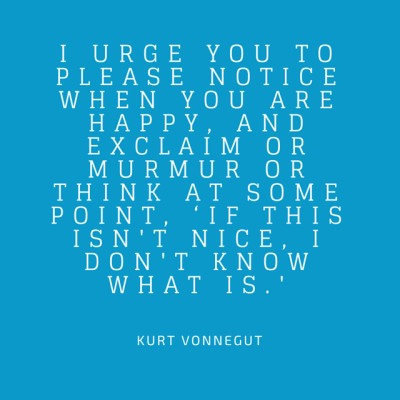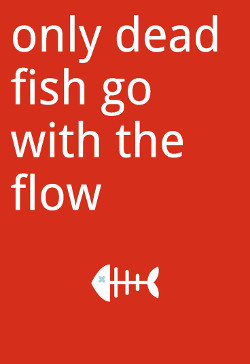Ahh, flow.
Many people I’ve talked to this year have made flow their word of the year. It’s one of those words that makes your mind and body just go “aaahhh.” We won’t resist, we’ll go with the things that present themselves. It will all be good.
Where does your life flow?
I’ve found that there’s no single ‘flow’. Depending on the hour and the season flow can feel like being dragged along a current, hitting rocks as I go along. Sometimes it can feel like a lazy river ride. Other times I can use my creative powers to shape the flow.
Sometimes going with the flow means getting dragged along from mess to mess. Things flow along but, holy mother, you’d have them flow in a different way if you could. One thing leads to another, and not in a good way. There’s a powerlessness to stop things from falling apart. This kind of flow doesn’t have the “aaahhh” factor.
I call this dead fish flow.
If your mind runs towards worry then large chunks of life can feel like the dead fish flow. A string of difficult happenings, or a chronic difficult situation, can retrain our brains to feel like we can’t get out of dead fish flow. Our brains focus our attention to what’s in crisis, having us concentrate on our fears about the situation. We forget that the other parts of our life are still flowing well.
Mindfulness helps here by staying present to the moment. When it feels like everything is going badly we can take a moment out and smooth our breathe to calm our amygdala, the fear centre of our brain. This helps us see that it’s only a couple of things that are going badly. Mostly things are going pretty well. I mean, we’re still breathing.
Good practices in the midst of dead fish flow can be counting your blessings, journalling the good things, and taking time to savour even the smallest of pleasures. A very wise woman told me that when life looks like this we can change our experience by giving our best efforts to the difficulty, lavish as much love as we can, then bless the situation and let it go. Flow forward.
Go With The Flow
The next kind of flow happens when things are going smoothly and nothing thing is heading in a terrible direction. Life is easy and good. It’s a restful place of flow.
“Our life has seasons when we can just live in that time – we should just live. Embrace your season and whatever that means. If it means looking at the stars, then look at them with your entire soul.” — Caroline Gravino
Take time to take a rest, to catch your breath, get to the gym, stop and smell the roses, do some extra mindfulness practice, create. This time is a gift.
Practicing mindfulness – doing things with your entire soul – during this kind of flow makes it easier to speed through the dead fish flow. As you start to see your blessings and gain some perspective on the difficulties you stop concentrating so hard on the difficult bits and just go with it all.
Creating Flow
The third kind of flow happens on purpose. It’s the flow that Mihaly Csikszentmihalyi describes in his book, Flow. It’s exciting to know that we can create this kind of flow whenever we want to.

We create it by placing ourselves in the path of growth – the place just a hair beyond our skills doing something that we really want to get better at. Often this kind of flow is seen as a positive thing for our work, and that’s true. But it is also very useful for the things we want to unfold and heal.
We create flow by challenging ourselves in a friendly way to do the things we enjoy – body movement like dance and exercise; expressive arts like writing and journalling; or in creating beauty in photography or painting. The beauty of this kind of flow is that it brings us closer to our spirit. It touches the deeply nourishing core of ourselves – that small, still place within.
Creating this kind of spirit-based flow feels something like this:
- You feel challenged, but not beyond what you’re capable of.
- You’re clear on what comes next and you don’t have to overthink how to do it.
- You can see for yourself that you’re doing well and you don’t need others to tell you.
- Your attention is completely focused on what you’re doing.
- You enjoy what you’re doing.
- Time seems to have a different pace – either faster or slower.
- When you finish you feel great.
How Do I Get Some of That?
So how do we get into this creative, spirit-based flow?
Think of something you’re interested in creating or enhancing in your life. It may be better relationships. It may be a creative endeavour. It may be something that gives you pleasure, like singing or dancing. Then, every day do one small thing that challenges the edge of your abilities.
If you want to be more present to others – take time to be more present to one conversation. Choose someone who is a bit difficult to listen to. Don’t do it for long – just enough time to feel like it’s a stretch and not a burden. Connect to your breathing and take in the body information about how it feels to listen more deeply. Put your whole being into the thing and do it for as long as you can maintain that kind of attention.
Developing this kind of flow can be intensely personal. It can be very helpful when we’re going with the dead fish flow. It reminds us of our talents and our ability to create beauty no matter what is happening around us. It can be a salve through the tough times.
I’ll leave you with a story about flow. . .
Carving Up an Ox – Daoist philosopher Zhuangzi
Cook Ting was cutting up an ox for Lord Wen-hui. As every touch of his hand, every heave of his shoulder, every move of his feet, every thrust of his knee — zip! zoop! He slithered the knife along with a zing, and all was in perfect rhythm, as though he were performing the dance of the Mulberry Grove or keeping time to the Ching-shou music.
“Ah, this is marvelous!” said Lord Wen-hui. “Imagine skill reaching such heights!”
Cook Ting laid down his knife and replied, “What I care about is the Way, which goes beyond skill. When I first began cutting up oxen, all I could see was the ox itself. After three years I no longer saw the whole ox. And now — now I go at it by spirit and don’t look with my eyes. Perception and understanding have come to a stop and spirit moves where it wants. I go along with the natural makeup, strike in the big hollows, guide the knife through the big openings, and following things as they are. So I never touch the smallest ligament or tendon, much less a main joint.
“A good cook changes his knife once a year — because he cuts. A mediocre cook changes his knife once a month — because he hacks. I’ve had this knife of mine for nineteen years and I’ve cut up thousands of oxen with it, and yet the blade is as good as though it had just come from the grindstone. There are spaces between the joints, and the blade of the knife has really no thickness. If you insert what has no thickness into such spaces, then there’s plenty of room — more than enough for the blade to play about it. That’s why after nineteen years the blade of my knife is still as good as when it first came from the grindstone.
“However, whenever I come to a complicated place, I size up the difficulties, tell myself to watch out and be careful, keep my eyes on what I’m doing, work very slowly, and move the knife with the greatest subtlety, until — flop! the whole thing comes apart like a clod of earth crumbling to the ground. I stand there holding the knife and look all around me, completely satisfied and reluctant to move on, and then I wipe off the knife and put it away.”
“Excellent!” said Lord Wen-hui. “I have heard the words of Cook Ting and learned how to care for life!”
Translated by Burton Watson (Chuang Tzu: The Basic Writings, 1964)


